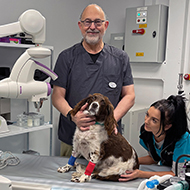
Pioneering system can treat skin cancer and dermatological disorders.
The UK's first superficial radiation therapy (SRT) service for pets has launched in Wakefield, West Yorkshire.
The pioneering Xstrahl 100 superficial radiotherapy system, based at Paragon Referrals, is designed for skin cancer, dermatological disorders, certain types of benign disease and some palliative care.
Its introduction follows the successful use of the therapy by oncology specialist, Dr Rodney Ayl, in the USA. Commonly used in human medicine, Dr Ayl successfully adapted the SRT system's use from humans to animals.
“This is a very exciting development for us and our clients because Xstrahl systems have been used so successfully in human medicine for many years,” explained Dr Ayl. “This prompted us to explore adapting the SRT system for veterinary use in the UK and we hope to collaborate with Colorado State University, which has a similar unit, to develop protocols for pets.
“We believe this will be a significant advance in the treatment and care of animals, and we’re delighted to be at the forefront of introducing this new service,” he added. “It is the only one of its kind for pets in the UK, and there are very few units like this anywhere in the veterinary industry, so it really is an important move forward.”
Dr Ayl also believes that the SRT system for animals will not only transform their treatment, but also the logistics and cost of radiation therapy for dermatological conditions.
“The treatment is less stressful from the outset and, thanks to its mechanism of action, it is also pain-free,” he continued. “Its use of different size cones, directly over the lesion, minimises effects on healthy skin and the fast treatment means a large reduction in time and impact on the patient’s day-to-day life while providing a highly effective treatment.
“The machine’s flexibility also makes it particularly suited for treating multiple lesions that are difficult to access, such as the head and neck, without changing patient positioning,” he said.
Image (C) Paragon Referrals.



 The Veterinary Medicines Directorate (VMD) is inviting applications from veterinary students to attend a one-week extramural studies (EMS) placement in July 2026.
The Veterinary Medicines Directorate (VMD) is inviting applications from veterinary students to attend a one-week extramural studies (EMS) placement in July 2026.